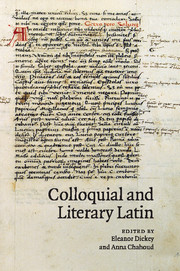Book contents
- Frontmatter
- Contents
- List of contributors
- Acknowledgements
- Foreword (David Langslow)
- PART I THEORETICAL FRAMEWORK
- PART II EARLY LATIN
- PART III CLASSICAL LATIN
- PART IV EARLY PRINCIPATE
- 17 Petronius' linguistic resources
- 18 Parenthetical remarks in the Silvae
- 19 Colloquial Latin in Martial's epigrams
- 20 Current and ancient colloquial in Gellius
- 21 Forerunners of Romance -mente adverbs in Latin prose and poetry
- PART V LATE LATIN
- Abbreviations
- References
- Subject index
- Index verborum
- Index locorum
18 - Parenthetical remarks in the Silvae
Published online by Cambridge University Press: 04 April 2011
- Frontmatter
- Contents
- List of contributors
- Acknowledgements
- Foreword (David Langslow)
- PART I THEORETICAL FRAMEWORK
- PART II EARLY LATIN
- PART III CLASSICAL LATIN
- PART IV EARLY PRINCIPATE
- 17 Petronius' linguistic resources
- 18 Parenthetical remarks in the Silvae
- 19 Colloquial Latin in Martial's epigrams
- 20 Current and ancient colloquial in Gellius
- 21 Forerunners of Romance -mente adverbs in Latin prose and poetry
- PART V LATE LATIN
- Abbreviations
- References
- Subject index
- Index verborum
- Index locorum
Summary
INTRODUCTION
Most of the poems in the Silvae have a personal addressee, usually a senator or an equestrian; sometimes the emperor. Depending upon the status of the recipient and the relative gravity of the topic, Statius may adopt a more – or less – jocular tone. Short parenthetical remarks that are characteristic of colloquial language usually lend an air of informality when they are employed in literary works. Hence we would expect to find them in a poem such as Statius' hendecasyllables to Plotius Grypus, complaining about the unsuitable present that Statius received from him for the Saturnalia; indeed, the climax of the long list of items that Statius would have preferred to Grypus' gift contains two colloquial parentheses within a sentence of four lines (4.9.42–5):
ollaris, rogo, non licebat uvas,
Cumano patinas vel orbe tortas,
aut unam dare synthesin (quid horres?)
alborum calicum atque caccaborum?
Couldn't you, please, have sent preserved grapes, or plates turned on a Cumaean wheel, or a table-set (why are you shuddering?) of plain white mugs and dishes?
Parenthetic formulae of request (rogo, 42) are characteristic of colloquial speech, which favours parataxis over hypotaxis (H–S 472; Hofmann 1951: 129–30, 199).
- Type
- Chapter
- Information
- Colloquial and Literary Latin , pp. 292 - 317Publisher: Cambridge University PressPrint publication year: 2010
- 1
- Cited by



